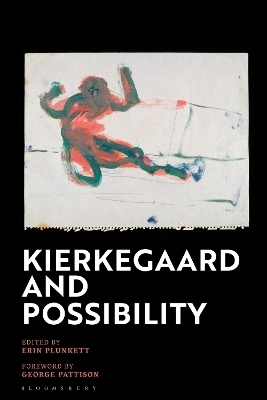
Kierkegaard and Possibility
Bloomsbury Academic (Verlag)
978-1-350-29902-3 (ISBN)
- Noch nicht erschienen (ca. Februar 2025)
- Versandkostenfrei innerhalb Deutschlands
- Auch auf Rechnung
- Verfügbarkeit in der Filiale vor Ort prüfen
- Artikel merken
The term ‘possibility’ (Mulighed) and its variants occur with curious frequency across Kierkegaard’s writings. Key to Kierkegaard’s understanding of the self, possibility is linked to a number of core concepts in his works: from imagination, anxiety, despair, and ‘the moment’ to the idea in The Sickness Unto Death that “God is that all things are possible”. Responding to what he sees as a Hegelian and Aristotelian misunderstanding of possibility, Kierkegaard offers a novel reading of the possible that, in turn, directly influences 20th-century philosophers such as Heidegger, Deleuze, and Derrida.
Kierkegaard gives a rich account of how anxiety and despair, as lived experiences of possibility, not only show us the contingency and fragility of the systems and identities we presently inhabit but also reveal a more fundamental contingency that demands a new way of relating to the possible. For Kierkegaard, hope, faith, and love are attitudes in which meaning is forged by embracing contingency. In a time of political, social, and environmental uncertainty Kierkegaard’s work on radical possibility seems more relevant than ever.
Erin Plunkett is Lecturer in Philosophy and Religious Studies at the University of Hertfordshire, UK. She is author of A Philosophy of the Essay (Bloomsbury, 2018) and editor of The Selected Writings of Jan Patocka (Bloomsbury, 2022)
Foreword, George Pattison (University of Glasgow, UK)
Introduction: Existence and possibility, Erin Plunkett (University of Hertfordshire, UK)
Part I: Possibility and the Philosophical Tradition
1. From Possibility to Actuality and Back Again: Kierkegaard’s Ontology of the Possible and the Actually Ideal, Jeff Hanson (Harvard University, USA)
2. ‘What Our Age Needs Most’: Kierkegaard's Metaphysics of Virkelighed and the Crisis of Identity of Philosophy, Gabriel Ferreira (UNISINOS, Brazil)
Part II: Possibility and Experience
3. Possibility, Meaning, and Truth: Kierkegaardian Themes in Proust, Rick Anthony Furtak (Colorado College, USA)
4. The Secrecy of Possibility in Kierkegaard’s “Pattern”, Frances Maughan-Brown (College of the Holy Cross, USA)
5. Kierkegaard and Deleuze: Anxiety, Possibility and A World Without Others, Henry Somers-Hall (Royal Holloway, University of London, UK)
Part III: Possibility and Freedom
6. On Being Educated for the Possibility by The Concept of Anxiety, Jakub Marek (Charles University, Czech Republic)
7. Isaac I cannot Understand: Sacrifice and the Possibility of Radical Intersubjectivity, Tatiana Chavalková Badurová (Charles University, Czech Republic))
Part IV: Possibility and Hope
8. Just a Glance! Kierkegaard’s Eschatology of the Possible, Saitya Brata Das (Jawaharlal Nehru University, India)
9. Climate Despair from a Kierkegaardian Perspective: Asceticism, Possibility and Eschatological Hope, Hjördis Becker-Lindenthal (Cambridge University, UK)
10. Hope in the Task of Forgiveness, John Lippitt (Institute for Ethics & Society at Notre Dame, Australia)
Bibliography
Index
| Erscheint lt. Verlag | 20.2.2025 |
|---|---|
| Verlagsort | London |
| Sprache | englisch |
| Maße | 156 x 234 mm |
| Themenwelt | Geisteswissenschaften ► Philosophie ► Geschichte der Philosophie |
| Geisteswissenschaften ► Philosophie ► Metaphysik / Ontologie | |
| Geisteswissenschaften ► Philosophie ► Philosophie der Neuzeit | |
| ISBN-10 | 1-350-29902-2 / 1350299022 |
| ISBN-13 | 978-1-350-29902-3 / 9781350299023 |
| Zustand | Neuware |
| Informationen gemäß Produktsicherheitsverordnung (GPSR) | |
| Haben Sie eine Frage zum Produkt? |
aus dem Bereich


